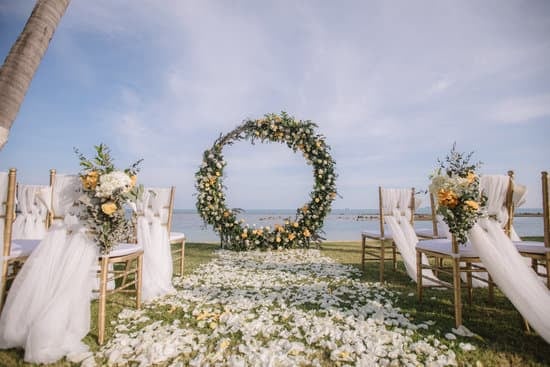Are you wondering how soon before a wedding should invitations be sent out? The timing of sending out wedding invitations is crucial in ensuring that your guests have enough notice to make plans to attend your special day. In this article, we will explore the traditional timeline for sending wedding invitations, factors to consider when setting the wedding invitation timeline, and tips for sending out invitations for destination weddings.
Wedding invitations are an essential part of the wedding planning process, as they provide guests with important information about the event and set the tone for the celebration. From the design and wording to the RSVP details, each element of the invitation plays a key role in communicating the couple’s vision for their big day.
When it comes to determining how soon before a wedding invitations should be sent out, there are various factors to take into consideration. The traditional timeline for sending out wedding invitations typically ranges from 6-8 weeks before the wedding date. However, certain circumstances such as destination weddings or holiday weekends may warrant a longer lead time for guests to make necessary arrangements.
In addition to exploring the traditional timeline for sending wedding invitations, we will also discuss modern alternatives to traditional invitations and address common etiquette questions related to wedding invites. Whether you’re planning a classic formal affair or a more contemporary celebration, understanding the importance of wedding invitations and how soon they should be sent out is key to ensuring a memorable and well-attended event.
Traditional Timeline for Sending Wedding Invitations
When it comes to your wedding, sending out invitations at the right time is crucial. The timeline for sending out wedding invitations is an essential factor that needs careful planning and consideration. Many people often wonder, “how soon before a wedding should invitations be sent out?”.
Traditionally, wedding invitations are typically sent out six to eight weeks before the big day. This allows enough time for guests to clear their schedules, make travel arrangements (if necessary), and RSVP by the requested date.
However, there are several factors that can influence this timeline. For example, if you’re having a destination wedding or getting married during a peak travel season, it’s best to give your guests more notice by sending out save-the-dates at least six months in advance and then following up with formal invitations around three months before the wedding date.
| Timeline Point | Timing |
|---|---|
| Send Save-the-Dates (destination weddings or peak travel seasons) | 6 months before the wedding |
| Send Formal Invitations | 6-8 weeks before the wedding |
| RSPV Due Date | No later than 3 weeks before the wedding |
Factors to Consider When Setting the Wedding Invitation Timeline
When it comes to setting the timeline for sending out wedding invitations, there are several factors that couples should consider. From the type of wedding they are planning to the location and even the time of year, these elements can all play a role in determining when invitations should be sent out.
Wedding Date and Location
The date and location of the wedding are perhaps the most important factors to consider when setting the invitation timeline. For local weddings, it is customary to send out invitations 6-8 weeks before the big day. However, for destination weddings or weddings that coincide with peak travel seasons, couples may want to give their guests extra time by sending out invitations 3-4 months in advance.
Guest List Size and Complexity
The size and complexity of the guest list can also impact the timeline for sending out wedding invitations. For large weddings with many out-of-town guests or international invitees, couples may want to err on the side of caution and send out save-the-dates as early as 6-12 months in advance, followed by formal invitations 2-3 months before the wedding.
Personal Preferences and Circumstances
Ultimately, personal preferences and circumstances will also play a role in determining when to send out wedding invitations. Some couples may have specific cultural or religious traditions that dictate a certain timeline for sending invitations. Others may simply prefer to give their guests as much notice as possible, regardless of other factors. In any case, it is important for couples to carefully consider all relevant factors before finalizing their wedding invitation timeline.
Save the Dates vs Formal Invitations
Save the dates and formal wedding invitations serve different purposes in the wedding planning process. The “save the date” cards are typically sent out 6 to 12 months before the wedding date to inform guests of the upcoming nuptials and give them time to mark their calendars.
This is especially important for destination weddings or weddings that will require significant travel arrangements. On the other hand, formal wedding invitations are sent out around 6 to 8 weeks before the big day and include all the pertinent details such as the ceremony location, reception venue, dress code, and RSVP information.
When deciding on the timeline for sending out save the dates and formal invitations, there are several factors to consider. These may include how many out-of-town guests you have, whether it’s a destination wedding, if there are any major holidays or events around your wedding date that could affect travel plans, and whether you want a longer engagement period for your guests to plan ahead.
It’s important to keep in mind that while sending out save the dates is a common courtesy, it is not mandatory. However, sending out formal invitations is essential for conveying all necessary information and obtaining an accurate headcount for your wedding. By understanding the difference between save the dates and formal invitations, couples can effectively manage their wedding invitation timeline leading up to their special day.
Tips for Sending Out Invitations for Destination Weddings
Destination weddings require a bit more planning and consideration when it comes to sending out invitations. The logistics of traveling to a different location for a wedding can be more complex than attending a local ceremony. Here are some tips to help you navigate the invitation process for destination weddings.
Planning Ahead
When it comes to destination weddings, it’s important to give your guests as much notice as possible. Typically, invitations for destination weddings should be sent out at least six to eight months in advance. This allows your guests enough time to make travel arrangements, request time off from work, and budget for the trip. Sending out save the date cards even earlier can be beneficial for destination weddings, giving guests a heads up about the upcoming event.
Include Important Details
Since destination weddings involve travel, it’s important to include all necessary details in the wedding invitation. This includes information about accommodations, transportation options, local attractions, and any pre or post-wedding events that guests are invited to attend. Providing all relevant details in the invitation can help guests plan their trip with ease.
Consider RSVP Timeline
Given that attendees will need time to plan and book their trip, it’s advisable to set an earlier RSVP deadline for destination weddings. Typically, RSVPs should be due at least 6-8 weeks before the wedding date. This will give you ample time to finalize arrangements with vendors and provide accurate guest counts to your venue. It also allows you some buffer time if there are any last-minute cancellations or changes that need addressing prior to the event.
Sending out invitations for a destination wedding requires careful planning and consideration of your guests’ needs. By following these tips and allowing plenty of time for preparation, you can ensure that your destination wedding is a memorable and enjoyable experience for everyone involved.
How Far in Advance Should RSVPs Be Due?
When planning a wedding, it’s important to establish a timeline for sending out invitations and receiving RSVPs. The timing of RSVPs can impact your final headcount and dictate other logistics, such as seating arrangements and catering orders. Here are some factors to consider when determining how far in advance RSVPs should be due:
Factors to Consider:
1. Wedding Venue Requirements: Check with your wedding venue to see how far in advance they need a final headcount. Some venues may require this information several weeks before the event in order to properly prepare.
2. Travel and Accommodations: If your wedding is taking place at a destination that requires travel or overnight accommodations, consider giving guests more time to respond in order to make their necessary arrangements.
3. Complexity of Seating Arrangements: If you plan on having assigned seating at your wedding, it’s important to have an accurate headcount before finalizing seating arrangements. This may require setting an earlier RSVP deadline.
How Far in Advance Should RSVPs Be Due?
To help ensure that you receive responses from all of your invited guests, it is recommended to set the RSVP deadline for 3-4 weeks before the wedding date. This allows enough time for late responders or any last-minute changes without causing added stress. By setting a firm deadline, you can also better manage any unexpected hiccups and address them promptly.
Dealing With Last-Minute Changes and Updates
When it comes to planning a wedding, unexpected changes and updates are almost inevitable. Whether it’s a change in venue, date, or even guest list, knowing how to handle these last-minute adjustments when it comes to wedding invitations is crucial. One of the most important things to keep in mind is communication. In these situations, it’s essential to communicate as soon as possible with your guests.
If a last-minute change occurs before the formal invitations have been sent out, consider using electronic communication methods such as email or social media to inform your guests. This way, you can quickly and efficiently relay any changes without the delay of printing and sending new invitations. However, if the change happens after formal invitations have been sent out, be prepared to follow up with a phone call to ensure that all guests are aware of the new details.
It’s also vital to update your wedding website and any other platforms where guests may look for information about your big day. This will help ensure that everyone has access to the most up-to-date information regarding your wedding. Keeping guests informed and being proactive about addressing last-minute changes will help minimize any confusion or inconvenience for everyone involved.
| Wedding Invitations | Timeline |
|---|---|
| Traditional Timeline | 6-8 weeks before |
| R.S.V.P Due Date | 3-4 weeks before |
| Last-Minute Change Handling | Communication is key. |
Modern Alternatives to Traditional Wedding Invitations
In today’s fast-paced world, many couples are opting for modern alternatives to traditional wedding invitations. While the timeless elegance of paper invitations will always hold a special place in the hearts of many, there are numerous creative and convenient options available for those looking to add a unique touch to their wedding announcements.
One modern alternative to traditional wedding invitations is the use of electronic or digital invites. With the rise of technology, sending out digital invites has become increasingly popular due to its convenience and eco-friendly nature. Couples can design personalized digital invitations that reflect their wedding theme and style, and easily send them out to their guests via email or through social media platforms.
Another modern alternative is the use of video invitations. Couples can create engaging and personalized video clips to announce their wedding details and share them with their guests. Video invitations not only add a fun and personal touch but also allow couples to convey emotions and excitement in a way that traditional paper invites cannot.
For couples who want a blend of tradition and modernity, there is also the option of combining paper invitations with online RSVPs. This allows guests to respond conveniently through a wedding website or app, while still receiving a beautifully crafted paper invitation in the mail. This approach caters to both the sentimental value of physical invites and the practicality of digital communication.
The variety of modern alternatives to traditional wedding invitations offers couples the flexibility to choose an option that best represents their personalities and aligns with their vision for their special day. Whether it’s through digital invites, video announcements, or a combination of both, couples have an array of options available to make their wedding invitations stand out in today’s tech-savvy world.
Addressing Common Etiquette Questions for Wedding Invitations
In conclusion, the timing of when to send out wedding invitations is a crucial aspect of wedding planning. As discussed in this article, traditional timelines for sending out formal invitations typically range from six to eight weeks before the wedding date, allowing guests enough time to make necessary arrangements.
However, factors such as destination weddings, holiday weekends, and the need for save the dates may impact the timeline. It’s important for couples to consider these factors when setting their wedding invitation timeline.
For destination weddings, it is recommended to send out save the dates as early as six months before the wedding date, with formal invitations following shortly after. This gives guests ample time to plan and make travel arrangements. Additionally, RSVPs should be due at least three to four weeks before the wedding to provide couples with an accurate headcount for their celebration.
As technology continues to advance, modern alternatives to traditional wedding invitations have become increasingly popular. Couples now have the option of using digital invitations or creating personalized wedding websites to streamline communication with their guests. This offers a more convenient and eco-friendly approach while still maintaining proper etiquette.
Overall, addressing common etiquette questions for wedding invitations involves thoughtful consideration and communication with guests throughout the planning process. By carefully evaluating these factors and utilizing modern alternatives when needed, couples can ensure that their wedding invitations are sent out in a timely manner while adhering to proper etiquette guidelines.
Frequently Asked Questions
Is 4 Months Too Early to Send Wedding Invites?
Sending out wedding invites 4 months in advance is generally not too early, especially if you have guests who will need to make travel arrangements or take time off work. This gives them plenty of time to plan and RSVP without feeling rushed.
How Far in Advance Do Wedding Invites Go Out?
Wedding invites should ideally be sent out 6-8 weeks before the wedding date. This gives guests enough time to RSVP and make any necessary accommodations, while also not being so far in advance that they may forget about the invitation or lose it.
Is 3 Months Too Late to Send Out Wedding Invitations?
While sending out wedding invitations 3 months before the wedding can be cutting it close, it may still be acceptable depending on your specific circumstances.
It’s important to consider factors such as the location of the wedding, the availability of your guests, and whether you’ve already given them a save-the-date notice prior to sending out the formal invitation.

I have been involved in marriages for over 20 years helping couples and singles understand more about them.





